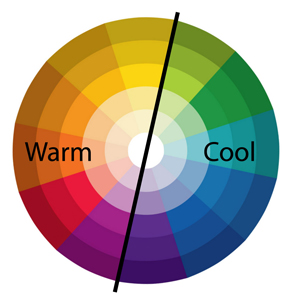 |

While red, orange and yellow are typically considered "warm" colors, different shades of red can be warmer or cooler than other shades.

A recognized authority on all things color-related, Kate Smith is a professional color strategist and the creator of sensationalcolor.com.

The red on the right is cooler than the red on the left in terms of relative color temperature.
The red on the right is cooler than the red on the left in terms of relative color temperature.
E-Mail Your Color Questions
Have a color challenge you need help with? Our color expert, Kate Smith, will be selecting questions from readers each month and answering them in upcoming articles. E-mail your color question to editor@homefurnishings.com.
More Cool Stuff on Color
Looking for more insights into the fascinating world of color? Check out Kate's website!
-
Ask Kate: Warm vs. Cool Colors
Learn how to select colors that have the perfect "temperature."
- by Kate Smith
Q. While I was looking at red paint swatches for my dining room, the salesperson at the paint store described one of the two red swatches as being warmer than the other. I'm confused by that comment because I thought all red hues were considered warm. How can I determine the difference?
A. In understanding and defining color, the terms "warm" and "cool" are often used to describe a color. In general blue, green and purple are considered cool colors while yellow, orange and red hues are considered warm.
What the salesperson was referring to is something known as relative color temperature. When comparing the different shades of a particular color, one can be warmer or cooler than another.
In the case of the two red hues, one would be described as cooler if has more blue or purple undertones; whereas a red with more orange or yellow undertones is warmer.
In general terms, both of the red swatches you were looking at would be considered warm. Relative to one another, however, one shade of a warm color could be cooler than another shade of that same color.

